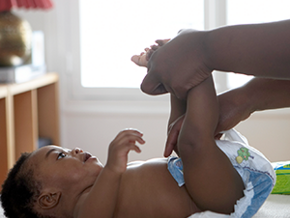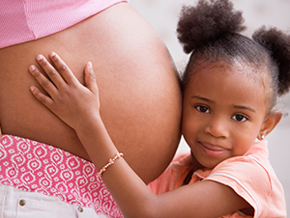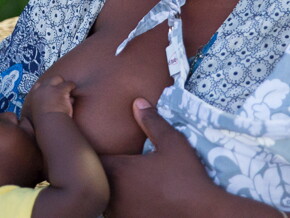
Healthy diet for nursing mothers:
Breastfeeding a baby requires you to take in a little bit more daily calories. Your body will usually tell you how often and how much you should eat. Eating whenever you start to feel hungry will help you preserve your energy and overall resistance. And if you go out, take nutritious snacks (like fruit or nuts) with you.
Plan ahead
Your time is seldom your own after your baby arrives, which can make eating well a challenge. But you need to eat regularly, so plan ahead. Stock the kitchen, refrigerator, and your handbag with healthy, easy-to-prepare snacks.
Keep it simple, fast and good
Focus on simple and nutritious foods that you can find and prepare easily; it doesn't have to be a gourmet meal! Preparing soups and vegetable stews in large quantities and freezing them in small containers to be microwaved later can be a real help as long as they're nutritionally balanced. A stir-fry or pasta dish is also ideal because you can make it quickly with fresh ingredients.
Smart snacks
Use snacks as another opportunity to add more nutritious foods to your diet. What’s the key? Keep a stash of smart snacks on hand, like nuts, crackers, fresh or dried fruit, or yoghurt, so when the urge hits, you'll be better prepared with a nutritious alternative. Eating healthy snacks between meals will also help you to avoid over-eating when lunch or dinner rolls around.
Quench your thirst
Try to drink about eight glasses (2 litres) a day. It will help you produce the milk your baby needs and keep you healthy, too. Reach for water and milk first; fruit and vegetable juices are okay but also contain lots of sugar. Limit your intake of soft drinks, coffee and tea. They are low in nutrients, may be high in caffeine, and have diuretic effects. All you have to remember is to drink whenever you feel thirsty, enough to stay comfortable, and you and baby will be fine.
Supplement support
Just as taking a multivitamin supplement is important during pregnancy due to a greater need for key nutrients, the same is true for when you are breastfeeding. During breastfeeding, your body’s needs for nutrients remain greater than they were pre-pregnancy. Follow the recommendation of your healthcare professional to know whether to keep taking your pre-natal vitamin when you breastfeed to ensure that you are meeting your nutrient requirements.1
Don’t diet
If you start a diet now and cut your calories while you're breastfeeding, you could be compromising your own nutritional well-being because your body will be drawing nutrients from you to produce breast milk. You'll feel tired and, what's more, you may not produce enough milk for your baby. Instead of trying to lose weight now, concentrate on creating a routine of healthy eating and living. By focusing on doing small positive things every day, you'll feel a whole lot better and you might very well start to lose weight anyway. Remember: this is no time to drastically cut calories or skip meals!
Tips for getting active after delivery
You’ve given birth to your bundle of joy and now your body is changing again
Muscles and joints are tightening and your hormones are changing. It takes time to recover from childbirth. Try not to be too concerned with weight loss during the first few months. When you should begin exercising and what types of activities you can participate in will in part depend on how your delivery went. Talk to your doctor before resuming physical activity.
Exercising with baby
There are plenty of ways to get active while keeping your baby nearby. Try these suggestions for enjoying exercise together:
- Walk with her in a front carrier.
- Stroll through the neighbourhood or run errands with her in the stroller.
- Talk to other mums about how they got active with their little one.
Breastfeeding and exercising
Mild to moderate exercise will not affect breast milk quality or composition. You may find that breastfeeding before your exercise session will help you to avoid engorged breasts. When exercising, wear a supportive bra such as a regular support bra or a postnatal sports bra, your local maternity store may have some good suggestions for you. Lastly, make sure that you are staying hydrating and eating enough to support both exercise and breastfeeding.
Learn to sleep when you can.
Preparing healthy meals and staying active will be hard to keep up if you’re completely exhausted. While your baby may not be sleeping through the night yet, and may in fact still be waking up several times, it's important to not let yourself get too run down. Instead of running errands or doing chores, try getting into the habit of sleeping when your baby sleeps during the day. This is a time when chores and errands can slide a little and this sleeping trick will help you feel more alert and energetic.
Alcohol and Drugs
While Breastfeeding Alcohol and drugs can pass through your system into your breast milk and potentially harm your baby. For more information about alcohol and drug use during breastfeeding, speak with your healthcare provider.
Reference:
1Wilson RD et al. Pre-conception Folic Acid and Multivitamin Supplementation for the Primary and Secondary Prevention of Neural Tube Defects and Other Folic Acid-Sensitive Congenital Anomalies. SOGC Clinical Practice Guideline, No. 324. J Obstet Gynaecol Can. 2015;29(12):1003-1013.


















